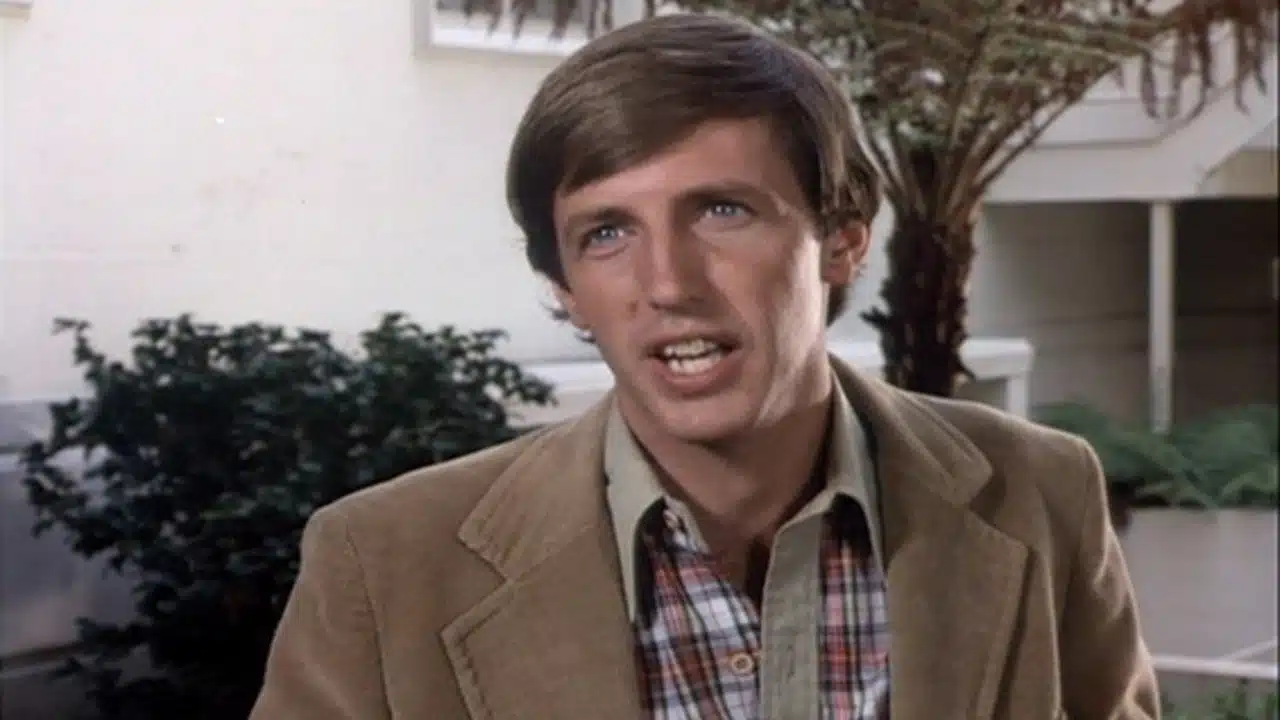In “Richie Brockelman And His American Dream”, Dale Davis discusses Richie Brockelman, the young private eye who appeared as a supporting character on The Rockford Files and as the lead of his own series, Richie Brockelman, Private Eye.
Mystery Tribune has previously published the essay “The Oddball Kid and the Adventure of the Paperback Heroes” by Mr. Davis.
*****
One day during lunch, my friend confessed his addiction to The Rockford Files. James Garner was great, he argued, the writing was great, but various supporting characters elevated the show above all other Seventies detective dramas. No series from that era had so many memorable minor characters, particularly the suave, yet irritating Lance White, played by Tom Selleck, or Rita Capkovic, played by Rita Morena, a call girl and sort-of damsel in distress to Rockford’s reluctant knight, or Gandolph Fitch, played by Isaac Hayes, who knew Rockford in prison and always called him Rockfish.
My friend made a good point, but of all the characters Jim Rockford encountered, Dennis Dugan’s Richie Brockelman fit the bill as the minor character who impressed me the most. Richie Brockelman was young. When he first appeared, he was twenty-two, and he had attended college. I was sixteen and stuck in high school. His parents pressured him about his life; I was pushing the boundaries my parents set for me. Richie refused to abandon his dream job as a private investigator. I was trying to survive high school and resisting pressure from others to map out the rest of my life before I graduated.
No series from that era had so many memorable minor characters, particularly the suave, yet irritating Lance White, played by Tom Selleck…
Being a private eye offered Richie the chance for independence. Here was a young guy, living his dream, working hard to attain that essential American quality of self-reliance, and like Richie, I was slow to realize that I had a lot to learn.
Richie began as the protagonist of his own pilot movie. His best story, however, came from his supporting role on the Rockford episode “The House on Willis Avenue.” In an interview posted on The Television Academy’s website, producer Stephen J. Cannell explains that Richie originated during a meeting with studio executives who wanted another television series from him. Cannell had nothing but an idea— “a private eye who’s a surfer.” The studio heads liked the idea. Later that day, Cannell told Stephen Bochco it was a terrible idea. The potential for this new character intrigued Bochco who advised Cannell to make the private eye a young man so nobody would take him seriously.
The pilot Richie Brockelman, Private Eye, “The Missing 24 Hours,” aired in October, 1976. Its plot could have been lifted from any number of detective shows. A woman, played by Suzanne Pleshette, hires Richie to drive her to San Diego. Why she needs to go there, she’s not sure. She suffers from amnesia and can’t remember much about the last twenty-four hours. She worries she may have been involved in a murder. To complicate matters, two men attempt to kidnap her. Richie discovers his client’s name is Elizabeth Morton, and she lives in San Diego with her husband. By the end of the episode, her memory returns, Richie rescues her from the bad guys, and the case is solved. While the plot didn’t match the potential of the “private detective who’s a surfer” concept, Richie’s age and inexperience intrigued me.
The only time we see Richie surfing occurs during the title sequence. The opening images of Richie riding a wave on his surf board represent the perfect metaphor for his life. Riding the waves represents Richie’s freedom from the mundane realities of work. Back on shore await clients in need of help, bills to pay, and the responsibilities of an adult life. Back on shore await his parents, his fiancé, and their demands for how he should live his life.
Those conflicting demands of family contribute to Richie’s frustrations. His parents live a conventional middle-class lifestyle. His mother wants Richie to settle down, get a stable job, and get married. She pesters him to quit playing detective and get a conventional job at the insurance company where his father works. She does her best to keep Richie at home, washing his laundry and putting his clean clothes in his old bedroom. His fiancé Darcy is spoiled, rich, and demanding. She usually gets what she wants if she whines enough to Richie and to Daddy. She also insists that Richie quit his job; after they marry, she will pressure Daddy to put Richie in an office job at his factory. Marrying Richie will provide Darcy with a compliant husband to show off at the country club.
Richie loves his mother and Darcy, but he resists their efforts to civilize him and force him into their versions of some conventional American Dream. His client Elizabeth Morton senses Richie’s troubles and tries to get him to talk about them. “The older I get the tougher it gets to sort out what’s going on in my life,” he tells her. Richie the detective hasn’t figured out the solution to living his life.
Elizabeth Morton is the show’s most confident woman. Suffering from amnesia, she doesn’t know who she is. Thirty-five years old, more than a decade older than Richie, she realizes she must find herself again when she learns that her husband is dead. She can’t sit at home and hope to survive on what her husband may have left her. She must look for a job.
She must work to survive financially, but work may afford her the opportunity to manage emotionally. She also refuses to embrace conventional widowhood. After the case is closed and Richie is unsure where his future lies, Elizabeth invites this younger man to her hotel room. Daring and risqué for the time, the scene borrows more from The Graduate than The Maltese Falcon. Like Richie, Elizabeth may be uncertain who she is, but if the future seems somewhat insecure, at least she can find some comfort in the physical embrace of another wanderer.
Elizabeth Morton is the show’s most confident woman.
Fathers and father figures add another major theme in this movie. Darcy’s bullying and bigoted father hates the idea of his daughter marrying this middle-class Jewish boy. He offers Richie a bribe to call off the engagement and leave Darcy, telling him that “culturally, ethnically, and every other way, you’re not our kind of person.” He reveals his contempt for Richie, calling him a “dead-beat, fly-ridden Hasidic scuttle-bum.”
Richie’s father, though, understands his son still has a lot to learn to achieve his independence. He wants his son to succeed. Unlike Darcy’s father, Mr. Brockelman does not own a successful business; he works for an insurance company. His job may not provide the spiritual or emotional satisfaction that Richie wants from private detective work, but over the years it provided the Brockelmans a nice home in a middle-class neighborhood and a comfortable middle-class lifestyle. His job secured their American dream.
Richie’s father is a realist. He knows that dream jobs don’t always pay the bills and provide for a family. Richie must commit to his work. Near the end of the movie, his father throws a series of questions at Richie that make him realize the case isn’t over and that he may have delivered Elizabeth into the hands of the bad guys who tried to kidnap her. When Mrs. Brockelman chastises her husband for encouraging Richie with more silly ideas of playing detective, Mr. Brockelman tells her, “If he’s going to be a detective, he damn well better learn to be a good one.”
The pilot was not picked up for a series until March 1978. Since so much time had passed, “The House on Willis Avenue” provided Cannell a way to reintroduce Richie Brockelman to America before he starred in his own series. The episode presents a troubling look at post-Watergate paranoia, corporate greed and corruption, and invasions of privacy that still plague our country. Rockford and Richie meet at the funeral of Joe Tooley, a private investigator who mentored both men as they started their detective careers. Both suspect something is not quite right with the way their mentor died.
By the end Rockford and Richie discover that a shady land development in the desert holds computer servers capable of collecting private data on 250 million people, all the work of a sinister and narcissistic technology expert, played by Jackie Cooper. The episode ends with a quotation from the U. S. Privacy Protection Commission’s report from 1977, stating, “Secret information centers, building dossiers on individuals, exist today. You have no legal right to know about them, prevent them, or sue for damages. Our liberty may well be the price we pay for permitting this to continue unchecked.”
The plot and the pairing of Garner and Dugan make “The House on Willis Avenue” Richie Brockelman’s most memorable appearance, notably as a supporting character rather than the story’s lead. The two-part episode aired during the fourth season of The Rockford Files, before Richie Brockelman, Private Eye began a five-episode run during the Rockford timeslot. Garner, with his established, laid-back style, assumes the role of reluctant mentor and father figure to Dugan’s scattershot and excitable Richie. Both are good at talking their way out of predicaments, and soon Rockford realizes that while Richie has a lot to learn about the PI business, the kid can handle himself when a situation becomes risky.
Richie’s desire to impress a mentor connects the story to “The Missing 24 Hours” in a significant way. Richie craves validation. He is still learning. His father wants him to succeed, but he’s simply Richie’s dad. We take our parents for granted. Parents always root for us, yet it is a mentor’s instruction and advice and approval that matter more. For Rockford to express a job well done validates Richie’s work.
Richie Brockelman came along when my parents and teachers expected me to map out the rest of my life and to mind my curfew for coming home on Saturday nights. Richie had the potential to grow and mature into a character as unconventional as the private eye surfer concept promised. America celebrated its Bicentennial in 1976, but a growing distrust in government took root in this post-Vietnam, post-Watergate society. Like many young people at the time trying to figure out their lives, Richie would have been too young to serve in Vietnam, but he may have been in college when Richard Nixon resigned in disgrace. He never grew older to settle down into a conventional middle-class lifestyle.
Richie showed promise. Through the years, he reminded me not to give up on my dreams. He was not playing the role of a detective; he was working to achieve his American Dream. He and I wouldn’t have admitted it, but we knew we had a lot to learn if we were going to be damn good at work.





